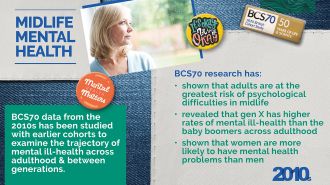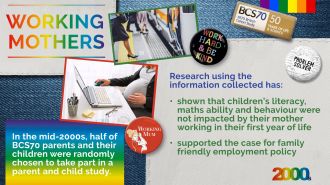- Our studies
- Our research
- Publications and resources
- Data access and training
- About
- News
- Events
- Get in touch
- Join our mailing list
Welcome to our news and blogs section. Here you’ll find the latest developments and insights from across our longitudinal studies.
Growing Up in Digital Europe (GUIDE) is the UK pilot of a major European initiative to create internationally harmonised data for research on child development and wellbeing.

People who remain members of clubs and societies throughout their lives tend to have a higher daily step count and exercise more in their mid-40s.

Up to one in five adults with a history of poor mental health reported they were ‘much worse off’ financially a year into the COVID-19 pandemic, compared to one in ten of those who had never had psychological problems in adulthood.

The 1970 British Cohort Study (BCS70) has been an important source of evidence on midlife mental health, helping to improve our understanding about why middle age is such a vulnerable period for adults.

Baby Boomers and Generation X are at the greatest risk of mental ill-health in middle age, finds new research by UCL.

The 1970 British Cohort Study (BCS70) has been an important resource for research into the potential impacts on children when mothers return to work.

Celebrating 50 years of the 1970 British Cohort Study – We’ve navigated through the 1990s, the decade when Cool Britannia was in full swing and BCS70 study members started to forge their own paths in the world. Here’s our animated tour of the decade.

Celebrating 50 years of the 1970 British Cohort Study – The Age 26 Sweep was the first adult follow-up of BCS70, and over 9,000 cohort members took part.
In honour of the 50th anniversary of the 1970 British Cohort Study, this scientific conference will showcase the latest cutting-edge research using CLS cohort data.

Gaining a degree gives a smaller boost to Millennials’ salaries than it did for members of Generation X 20 years ago, according to a new study.

Over the years, men who waited until their mid-20s to have their first child tended to report the best health in middle age, compared to those who started a family earlier. But, more recently, those who delayed fatherhood until their mid-30s appeared to be the healthiest in midlife.

Among the Baby Boomers and Generation X, people who had higher levels of emotional wellbeing during childhood and adolescence were more likely to report being satisfied with life when they reached adulthood.
At this event, organised by CLOSER, we will present results on the measurement properties of mental health measures, before and after harmonising these so that they can be compared across time and study.
Ryan Bradshaw
Senior Communications Officer
Phone: 020 7612 6516
Email: r.bradshaw@ucl.ac.uk